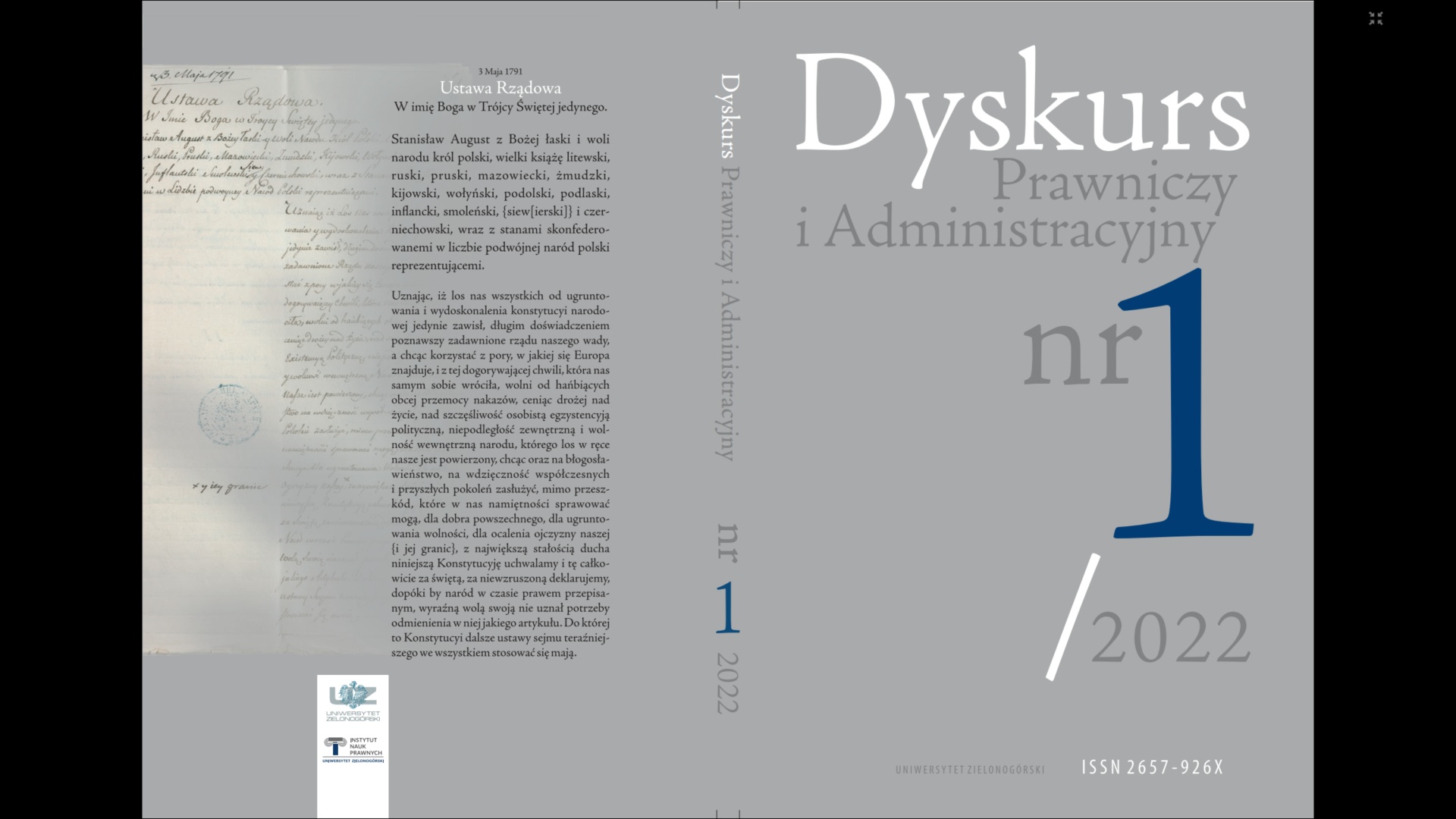A cassation judgment of a court of second instance – between the postulate of speed and the principle of two-instance proceedings
Keywords:
cassation judgment, revocation of the judgment and referral of the case for reconsideration, second-instance proceedings, appealAbstract
The issuance of a cassation judgment by the court of second instance pursuant to Art. 386 § 4 of the Code of Civil Procedure is preceded by three types of assessments: as to the legitimacy of the appeal, as to the occurrence of the premises indicated in the provision of Art. 386 § 4 of the Code of Civil Procedure, i.e. failure to recognize the essence of the case or the need to conduct evidence in its entirety and as to the legitimacy of the choice between issuing a cassation judgment or issuing a reform judgment. In jurisprudence, one may encounter statements distinguishing two independent criteria, which should be followed by the court of second instance when deciding on the content of the judgment in the event that the appeal is considered justified. Giving the prevailing importance to the criterion of speed argues in favor of issuing a reformatory judgment, but raises the question of the legitimacy of maintaining the optionality of a cassation judgment. The choice of deciding on the substance also leads to the fact that the substantive examination of the case takes place only once, in the court of second instance, which in turn calls into question the second separate criterion, which is the consideration of the principle of two-instance proceedings. The conducted analysis shows that the priority is given to maintaining the principle of two-instance proceedings: speed should be inferior to providing a party with access to two-instance proceedings, and thus, the threat to maintaining two-instance proceedings should eliminate the option of issuing a reform judgment. This means that in the circumstances provided for in Art. 386 § 4 of the Code of Civil Procedure, appropriate to the full appeal system deciding on the merits of the case is exceptional in practice. However, due to the fact that these circumstances are narrowly and exhaustively delineated, it does not diminish the indicated general rule and it happens infrequently.
References
Literatura
Ereciński T., Apelacja w postępowaniu cywilnym, Warszawa 2012.
Ereciński T., Apelacja w postępowaniu cywilnym, 2020, Lex/el.
Fruchs M.,Nowe zasady postępowania apelacyjnego wedle Kpc a praktyka małopolska, „Głos Prawa” 1934.
Kodeks postępowania cywilnego. Komentarz, t. II, Artykuły 367-505(39), red. T. Wiśniewski, 2021.
Orfin A., Sprawność postępowania karnego w świetle zasady prawdy materialnej i zasady bezpośredniości, „Ius Novum” 2012, nr 3.
Pilich M., Wpływ orzeczeń Trybunału Konstytucyjnego na Kodeks postępowania cywilnego, [w:] Orzecznictwo Trybunału Konstytucyjnego a Kodeks postępowania cywilnego. Materiały Ogólnopolskiego Zjazdu Katedr i Zakładów Postępowania Cywilnego, Serock k. Warszawy, 24-26 września 2009 r., red. T. Ereciński, K. Weitz, Warszawa 2010.
Mucha J., Pisemne zeznania świadka w kontekście dążenia sądu do ustalenia prawdy i postulatu szybkości postępowania cywilnego, „Ruch Prawniczy, Ekonomiczny i Socjologiczny” 2020, z. 3.
Rylski P., Nierozpoznanie istoty sprawy jako podstawa uchylenia orzeczenia w postępowaniu cywilnym, [w:] Stosowanie prawa. Księga jubileuszowa z okazji XX-lecia Instytutu Wymiaru Sprawiedliwości, red. A. Siemaszko, Warszawa 2011.
Summers R.S., Evaliating and improving legal processes – a plea for “process values”, „Cornell Law Review” 1974, s. 60.
System Prawa Procesowego Cywilnego, t. III, Środki zaskarżenia, red. T. Ereciński, J. Gudowski, LexisNexis 2013, Lex/el.
Warzocha E., Orzecznictwo sądów apelacyjnych w zakresie stosowania artykułów 385 i 386 § 1 i 4 Kodeksu postępowania cywilnego, Materiały Instytutu Wymiaru Sprawiedliwości, Warszawa 2005.
Wiliński P., Konstytucyjny standard prawa do sądu a proces karny, [w:] Węzłowe problemy procesu karnego, red. P. Hofmański, Warszawa 2010.
Wiliński P., Recenzja książki pt. Zagubiona szybkość procesu karnego. Jak ją przywrócić?, red. S. Waltoś, J. Czapska, Warszawa 2005,„Prokuratura i Prawo” 2006, nr 9.
Orzecznictwo
Wyrok TK z dnia 18 lutego 2009 roku, Kp 3/08, OTK nr 2A/ 2009, poz. 9.
Postanowienie SN z dnia 5 czerwca 1998 roku, III CKN 550/97, niepublikowane, cyt. w wyroku SO
w Gliwicach z dnia 12 października 2017 roku, VIII Pa 67/17, Lex nr 2421230.
Wyrok SN z dnia 13 listopada 2002 roku, I CKN 1149/00, Lex nr 75293.
Postanowienie z dnia 27 października 2005 roku, III SPP 142/04, Lex nr 180319.
Postanowienie SN z dnia 20 czerwca 2006 roku, III SPP 27/06, Lex nr 1101682.
Wyrok SN z dnia 20 lipca 2006 roku, V CSK 140/06, Lex nr 1101691.
Uchwała 7 sędziów SN – zasada prawna z dnia 31 stycznia 2008 roku, III CZP 49/07, Lex nr 341125.
Uchwała 7 sędziów SN z dnia 13 lutego 2008 roku, III SPZP 2/07, Lex nr 342345.
Wyrok SN z dnia 16 marca 2009 roku, III PK 63/08, Lex nr 707904.
Wyrok SN z dnia 20 marca 2009 roku, I PK 195/08, Lex nr 621551.
Postanowienie SN z dnia 5 grudnia 2012 roku, I CZ 168/12, Lex nr 1313709.
Wyrok SN z dnia 24 stycznia 2013 roku, II CSK 279/12, Lex nr 1294226.
Wyrok SN z dnia 17 kwietnia 2013 roku, I CSK 457/12, Lex nr 1341648.
Wyrok SN z dnia 9 stycznia 2014 r., V CSK 84/13, Lex nr 1446461.
Postanowienie SN z dnia 21 maja 2014 roku, II CZ 8/14, Lex nr 1483949.
Postanowienie SN z dnia 21 maja 2014 roku, II CZ 21/14, Lex nr 1495839.
Postanowienie SN z dnia 24 czerwca 2014 roku, I CZ 29/14, Lex nr 1521229.
Postanowienie SN z dnia 23 października 2014 roku, I CZ 63/14, Lex nr 1554254.
Postanowienia SN z dnia 26 listopada 2014 roku, III CZ 49/14, Lex nr 1565772.
Postanowienie SN z dnia 20 lutego 2015 roku, V CZ 112/14, Lex nr 1677146.
Postanowienie SN z dnia 1 kwietnia 2015 roku, III SZ 1/15, Lex nr 1710379.
Postanowienie SN z dnia 20 maja 2015 roku, I CZ 43/15, Lex nr 1764799.
Postanowienie SN z dnia 10 grudnia 2015 roku, V CZ 77/15, Lex nr 1957331.
Postanowienie SN z dnia 23 września 2016 roku, II CZ 73/16, Lex nr 2151416.
Postanowienie SN z dnia 30 maja 2017 roku, IV CZ 11/17, Lex nr 2327872.
Postanowienie SN z dnia 14 czerwca 2017 roku, V CZ 25/17, Lex nr 2340608.
Postanowienie SN z dnia 14 czerwca 2017 roku, IV CZ 17/17, Lex nr 2340602.
Postanowienia SN z dnia 6 grudnia 2017 roku, I CZ 104/17, Lex nr 2426565.
Postanowienie z dnia 28 marca 2018 roku, V CZ 19/18, Lex nr 2488961.
Wyrok SN z dnia 18 grudnia 2018 roku, II UK 433/17, Lex nr 2609202.
Postanowienie SN z dnia 22 września 2020 roku, II CZ 38/20, Lex nr 3130097.
Postanowienie SN z dnia 30 czerwca 2021 roku, I CZ 38/21, Lex nr 3213567.
Postanowienie SN z dnia 27 lipca 2021 roku, IV CZ 23/21, Lex nr 3327272.
Postanowienie SN z dnia 9 września 2021 roku, I CZ 56/21, Lex nr 3261152.
Postanowienie SN z dnia 15 grudnia 2021 roku, V CZ 35/21, Lex nr 3324502.
Wyrok SA w Łodzi z dnia 22 stycznia 2001 roku, II Aka 249/00, Lex nr 55375.

Published
How to Cite
Issue
Section
Copyright (c) 2022 Joanna Mucha

This work is licensed under a Creative Commons Attribution-NonCommercial-NoDerivatives 4.0 International License.


